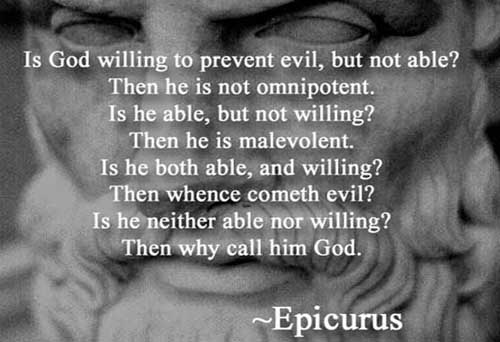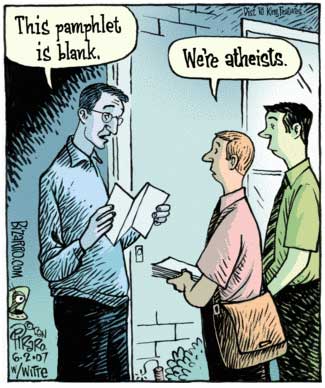Recently, an acquaintance of my brothers regrettably backed his vehicle over his own daughter and killed her. A seemingly horrible and needless evil, this is a pretty common accident. Children are so innocent. Why doesn’t God prevent it? The biggest challenge to the Christian worldview is the argument from evil. It is a serious problem. David Hume refined the argument to: “Is he willing to prevent evil, but not able? Then is he impotent. Is he able, but not willing? Then is he malevolent. Is he both able and willing: whence then is evil?”[1] Accordingly, the three common solutions to the problem of evil are based on three elements which in combination seem to have caused the predicament: God’s greatness, God’s goodness, and the presence of evil.[2] Each approach centers on a specific element.
The first solution is called finitism in that it makes God finite. It addresses God’s greatness, specifically by denying his omnipotence. God is attempting to conquer evil and would if he could but so far, has been unable to do so. This can also take the form of dualism in which there are two equal but opposite powers of good and evil interlocked in an eternal struggle. This is the belief of the Iranian religion Zoroastrianism. The good god, Ahura Mazda, is opposed by his evil twin side Ahriman. This accounts for evil but offers no real hope.
The second solution attacks the problem by redefining God’s goodness. The great presuppositional apologist Gordon H. Clark is used as an example for this approach. A staunch Calvinist, Clark was perhaps one of the most important evangelical philosophers and apologists of the twentieth century.[3] According to this view, the laws God imposes on humanity literally do not apply to him. Clark said, “I wish very frankly and pointedly to assert that if a man gets drunk and shoots his family, it was the will of God that he should do it.”[4] Whatever God does is right simply because he does it. His solution amounts to the syllogism: (1) Whatever happens is caused by God.(2) Whatever is caused by God is good. Therefore, whatever happens is good. The major problem with this approach is the word ‘good’ loses all of its meaning. If a man shooting his entire family is good, then what is evil? It makes God seem arbitrary.
The third solution is to deny the reality of evil. This is the view prevalent in pantheistic systems where everything is God. Evil is an illusion, a product of errant belief. Most of this line of thinking is borrowed from Hinduism. It was widely popularized in America by the Christian Science cult. In this cult, sickness and pain are seen as an illusion, along with evil, and of course it follows that the concepts of sin and death are an illusion as well. The problem is that it just doesn’t work. No matter what Mary Baker Eddy may have believed, she now has a grave that proves her wrong.
It is pretty clear that all three are unsatisfactory. Even more, they are not really compatible with a Christian worldview. The first and third are relatively obvious because the Bible makes it clear that God created everything good (Gen 1:31) and the existence of evil is hard to deny. The second is not as easy, as this is actually the work of a thoughtful Christian. I am somewhat sympathetic to Clark’s solution because the world seems to be such a brutal place. The story of Job is a good example. His family is killed for what appears to be a cosmic bet with Satan (Job 1:12). God does not try to justify his allowance of Satan’s evil perpetrated on Job and his innocent children. He asks basically “who are you to challenge me?” (Job 38:4) Thus, I must remain open to the possibility that, in light of eternity, even things as horrible as a man shooting his family or even running them down by accident may turn out to bring the best overall outcome. We just do not have the perspective to understand. Still yet, it is not practical to simply accept this solution.
Why not? Well let’s suppose that in light of the overwhelming pain and suffering we see in the world we accept the premise that, no matter how bad it is, it is God’s will is and that somehow God will bring a greater good from each evil. This is a common platitude that people offer up to a suffering friend, “rest assured God will turn this around and use it for good.” (Consoling pat on the back) Well if we truly accept that this is reality then what motivation do we have to fight evil or seek social justice? If all evil is being worked into a greater good, then when we stop the evil, we prevent the good. Clearly this is wrong as scripture tells us to oppose evil (2 Cor 10:5, Eph. 5:11, 1 Tim 6:12) and “learn to do good; seek justice, correct oppression; bring justice to the fatherless, plead the widow’s cause.” (Is 1:17) Thus, the only real value I see in this defense is that we must admit sometimes we just do not understand why God allows evil. Like with the fellow that ran over his daughter, sometimes the best thing to say is, “I don’t know.” God does comfort those who mourn (Mat 5:4).
I think it is also importan t to remember that God does not ask us to endure anything that he has not taken on himself. Indeed, God as the Son entered this sinful world as a man and endured the most brutal death imaginable. God as the Father watched his innocent Son be brutally beaten and crucified. I would remind the reader of Mel Gibson’s film, The Passion of the Christ. While each of these three common solutions goes too far, there are valid insights from each. The best approach is likely to understand the problem in light of all three and not focus too narrowly on one element. I prefer to address the problem in terms of an eschatological solution. God wants relationship and worship. Freedom is a necessary component for worship and relationship to be meaningful. Freedom is not really free if choosing evil is not a live possibility. Evil is a result of the misuse of freedom. God is working this out for the maximum good but it is a process. I have faith in God’s goodness and that we are in a process that will result in God banishing evil as he has promised (Rev 21:4).
t to remember that God does not ask us to endure anything that he has not taken on himself. Indeed, God as the Son entered this sinful world as a man and endured the most brutal death imaginable. God as the Father watched his innocent Son be brutally beaten and crucified. I would remind the reader of Mel Gibson’s film, The Passion of the Christ. While each of these three common solutions goes too far, there are valid insights from each. The best approach is likely to understand the problem in light of all three and not focus too narrowly on one element. I prefer to address the problem in terms of an eschatological solution. God wants relationship and worship. Freedom is a necessary component for worship and relationship to be meaningful. Freedom is not really free if choosing evil is not a live possibility. Evil is a result of the misuse of freedom. God is working this out for the maximum good but it is a process. I have faith in God’s goodness and that we are in a process that will result in God banishing evil as he has promised (Rev 21:4).
He will wipe away every tear from their eyes, and death shall be no more, neither shall there be mourning, nor crying, nor pain anymore, for the former things have passed away
[1] David Hume, Dialogues Concerning Natural Religion, part 10.
[2]Millard J. Erickson, Christian Theology, 2nd ed. (Grand Rapids, Mich.: Baker Book House, 1998), 439.
[3]Walter A. Elwell, Evangelical Dictionary of Theology: Second Edition (Grand Rapids, MI: Baker Academic, 2001), 271.
[4]Gordon H. Clark, Religion, Reason, and Revelation (Philadelphia: Presbyterian & Reformed, 1961), p. 221.





